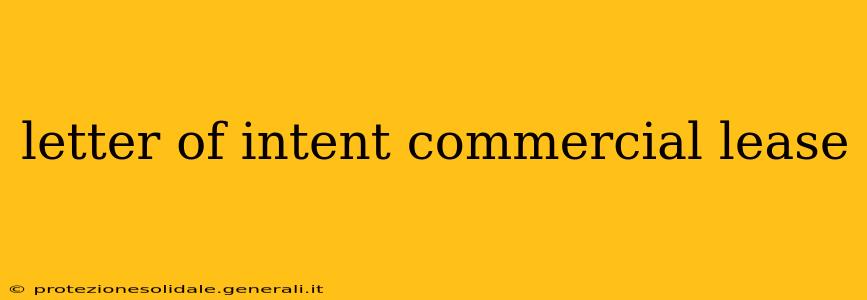A Letter of Intent (LOI) for a commercial lease is a crucial document in the process of securing a commercial property. It's not a legally binding contract, but it serves as a roadmap outlining the key terms and conditions both the landlord and tenant agree upon before committing to a formal lease agreement. This guide will walk you through everything you need to know about crafting a robust and effective LOI for your commercial lease.
What is a Letter of Intent for a Commercial Lease?
A Letter of Intent for a commercial lease is a non-binding agreement that expresses the mutual intentions of a landlord and tenant to enter into a lease agreement for a commercial property. It details the essential terms of the future lease, such as the property address, lease term, rent amount, and any other significant conditions. While it doesn't legally obligate either party, it demonstrates good faith and provides a framework for the final lease negotiation. Think of it as a serious preliminary agreement – a critical step before investing time and resources into a formal lease.
Key Elements of a Comprehensive LOI for Commercial Lease
A well-drafted LOI should include the following essential elements:
- Parties Involved: Clearly identify the landlord and tenant, including their full legal names and addresses.
- Property Description: Precisely describe the property, including its address, size (square footage), and any unique features.
- Lease Term: Specify the proposed lease duration, including the start and end dates.
- Rent Amount: State the agreed-upon monthly rent, including any additional charges like property taxes or common area maintenance (CAM) fees.
- Security Deposit: Outline the amount of the security deposit and the conditions for its return.
- Use of Premises: Clearly define the permitted use of the property. This is crucial, as unauthorized uses can lead to lease violations.
- Options to Renew: Specify any options for renewing the lease at the end of the term and the terms of renewal.
- Improvements: Detail any improvements the landlord will make to the property, along with timelines and responsibilities.
- Exclusivity Clauses (if applicable): These clauses outline whether the landlord will agree not to lease similar spaces to competitors.
- Contingencies: Identify any conditions that must be met before the formal lease is signed, such as financing approvals or inspections.
- Confidentiality: A clause protecting the confidentiality of information exchanged during negotiations.
- Exclusivity: If you want a guarantee that no competitor will lease space in the same building, an exclusivity clause is key.
- Brokerage: This section details any fees or commissions owed to real estate brokers involved.
What are the most common contingencies in a commercial lease LOI?
Financing Contingency: This is crucial if you're securing financing to lease the property. It allows you to withdraw from the agreement if you cannot obtain the necessary financing.
Inspection Contingency: This allows you to conduct a thorough inspection of the property to ensure it meets your needs and is in satisfactory condition. This often includes structural, environmental and other relevant reviews.
Due Diligence Contingency: This broader clause grants you a period to conduct a complete due diligence review of the property and associated paperwork before formally committing. This allows a review of any items that may not have been initially apparent.
Is a Letter of Intent Legally Binding?
No, a Letter of Intent is generally not legally binding unless it explicitly states it is. However, some clauses within the LOI may be enforceable if they're clear and unambiguous. It's crucial to consult with legal counsel before signing an LOI to understand your rights and obligations. While not legally binding, breaching a LOI can damage your reputation and jeopardize future business relationships.
How Does an LOI Differ From a Lease Agreement?
A Letter of Intent is a preliminary agreement, outlining the key terms. A lease agreement is a legally binding contract that details all the terms and conditions of the tenancy, including specific responsibilities, rent payment schedules, and dispute resolution mechanisms. The LOI is the blueprint; the lease agreement is the finished building.
What Happens After Signing a Letter of Intent?
Once both parties have signed the LOI, the next step is to work with legal counsel to draft a formal lease agreement. This agreement will include all the details outlined in the LOI, as well as additional clauses necessary for a complete and legally sound contract. The lease will be reviewed, negotiated, and ultimately signed to officially commence the tenancy.
By understanding the importance and key elements of a Letter of Intent for a commercial lease, you can navigate this crucial step in securing your commercial property confidently and effectively. Always seek legal advice to ensure your interests are protected throughout the process.
